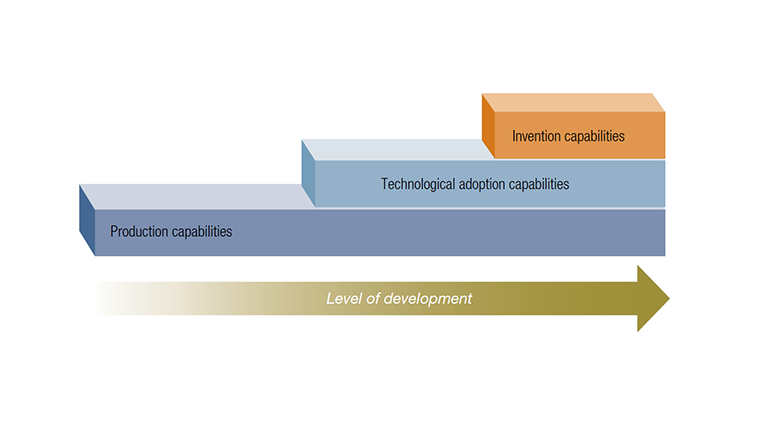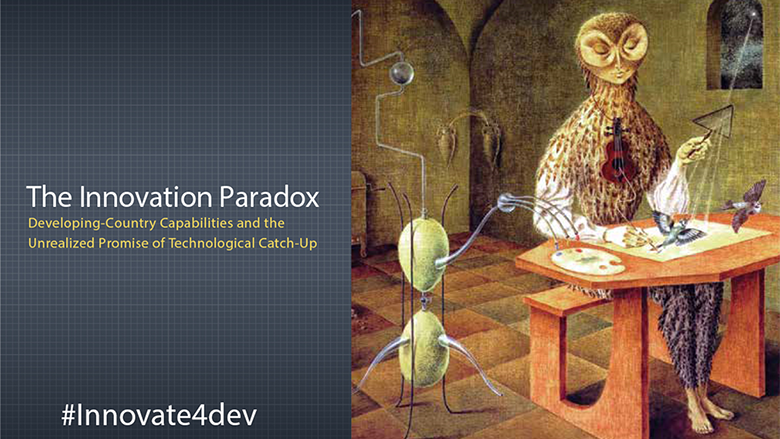There is vast potential for spurring economic growth by promoting innovation, yet developing countries do surprisingly little when it comes to adopting advanced-country techniques to upgrade their products, technologies, and business processes. Unless private-sector firms and public-sector policymakers in developing economies prioritize the more agile adoption of new technologies and techniques, they will find it difficult to overcome their enduring economic constraints – slow progress in building physical and human capital, under-developed managerial capabilities, and weak government capacity.
Those are the key findings of a new report by World Bank Group economists – Xavier Cirera and William F. Maloney – who exhort developing-country public and private-sector leaders to pursue a more focused approach to innovation policy.
The report, The Innovation Paradox: Developing-Country Capabilities and the Unrealized Promise of Technological Catch-Up, underscores the challenges that policymakers and entrepreneurs face in capturing the potential gains of innovation.
“The ability of lagging countries to tap into a now-massive stock of global know-how and technical knowledge — to be able to adopt what has already been invented — is a potential transfer of wealth from rich to poor of historic proportions,” the authors assert. “Yet relatively few developing countries have proven able to leverage this stock of knowledge to achieve sustained catch-up with advanced countries.”
“The potential gains from bringing existing technologies to developing countries are vast,” said Maloney, who is the Chief Economist of the World Bank Group’s Equitable Growth, Finance and Institutions practice group. “Yet developing-country firms and governments invest relatively little to realize this potential. That’s the origin of what we are calling ‘The Innovation Paradox’.”
The problem is most readily visible at the firm level, said Maloney, “Many companies in developing countries have proven to be unable to recognize and adopt higher-level technologies. Yet the problem is aggravated by enduring weaknesses in the public sector, which shape enabling environments that offer little support for innovative thinking and that have little capacity to design and implement policies that promote innovation through the upgrading of management techniques and firm-level processes.”
“Firms in developing countries should focus on building the foundations for successful innovation,” said Cirera, who is a Senior Economist in the World Bank Group’s Trade and Competitiveness Global Practice. “Innovation policies in developing countries cannot focus primarily on research and development. Instead, they must begin with strengthening managerial and organizational practices.”
Stronger management and a more nimble application of organizational science can help unlock economies’ growth potential – which hinges on moving countries closer to the “technological frontier.”
For the private sector in developing countries, the report asserts that the adoption of better firm-level managerial and organizational practices is an overlooked ingredient of success – a critical factor in innovating in products, processes, and upgrading the quality of their goods. These practices are also the building blocks to developing more sophisticated innovation projects that include the invention of new products and technologies.
The report argues that developing-country ministries and agencies often lack human capital and effective organizational structures at a time when designing and implementing innovation policy is becoming even more complex. Effective innovation policy requires choosing the appropriate combination of policy instruments in the context of scarce government capabilities. The report proposes a conceptual framework, the "capabilities escalator," where policies to support firm upgrading are sequenced in accordance with the level of capabilities of the private sector, as well as of policymakers and institutions, and ratchet up through progressively higher stages of sophistication.

Citing a celebrated maxim of Louis Pasteur, the 19th-century French biologist and chemist — “Fortune favors the prepared mind” — Maloney and Cirera conclude the report on a hopeful note. “Raising the capabilities of firms to manage uncertainty and chart their way forward — ensuring that the innovation system provides necessary complementary inputs and flows of knowledge, and strengthening government capabilities to manage a large and expanding set of challenges — are all keys to resolving the innovation paradox and preparing countries for the opportunities ahead.”
The Innovation Paradox is the first volume of a new World Bank Productivity Project, led by Maloney, which seeks to provide policymakers with “frontier thinking” on the measurement and determinants of productivity.


